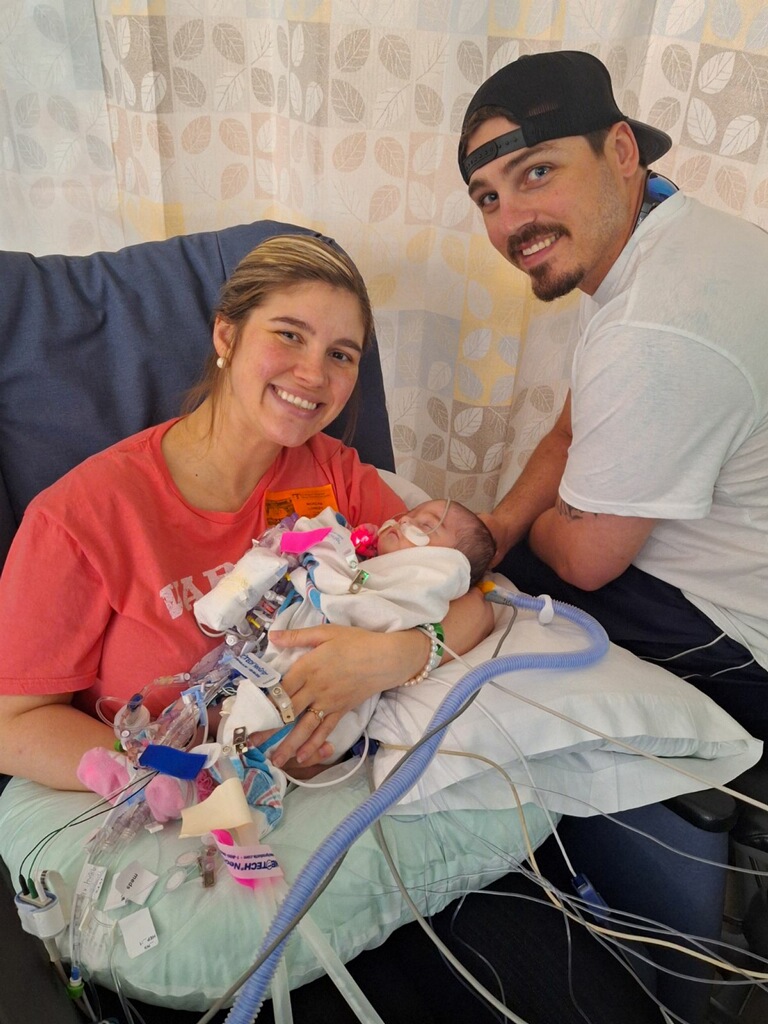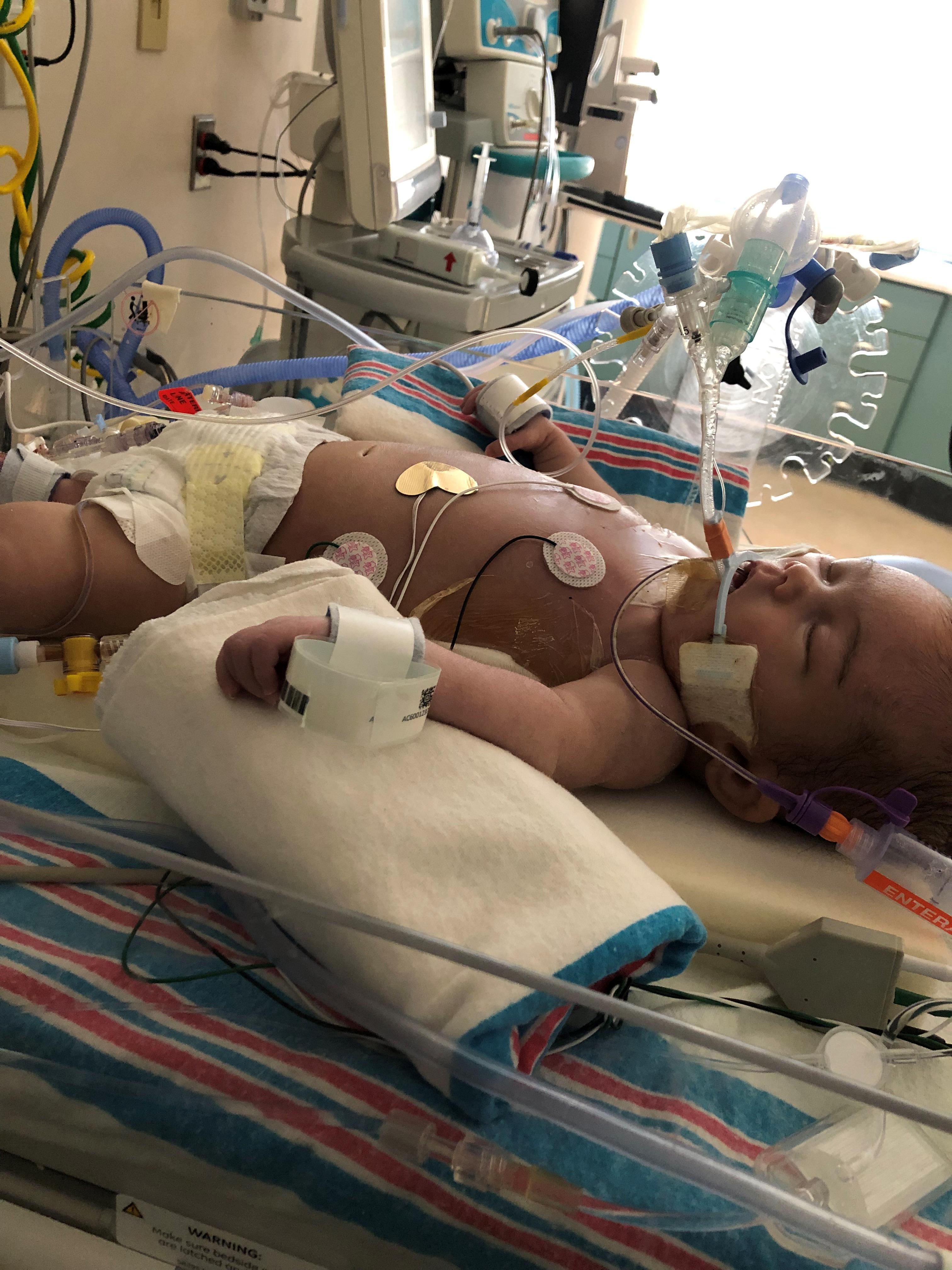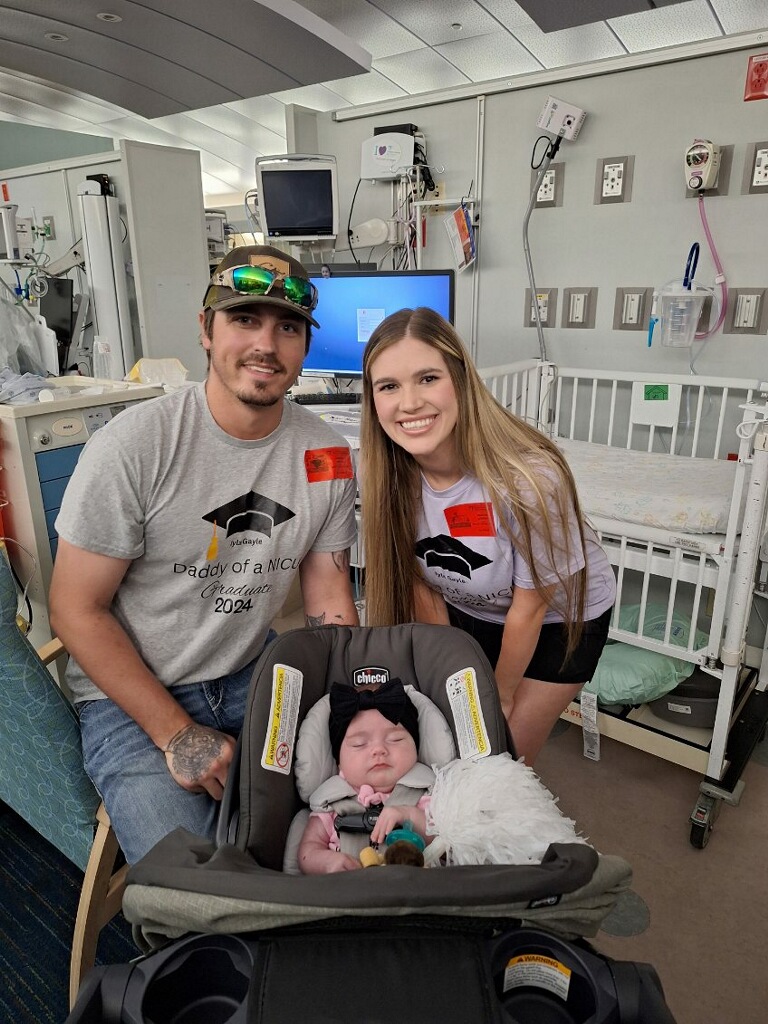Against all odds: Baby Iyla’s journey through respiratory challenges, ECMO, and a 3-month NICU stay
- Category: Patient Stories
- Posted on:

Morgan and Ryan Welch had been eagerly trying to start a family, and when the moment finally came, it was nothing short of a miracle.
"I was completely shocked," Morgan recalls. "At first, I didn’t think I was able to get pregnant. We had been trying for a while, so I was thinking, well, if it happens, it happens. And it happened."
The day Morgan discovered she was pregnant is one she'll never forget.
"My husband was home, and I just told him. I took a pregnancy test and said, 'Can you come here for a second?' I told him, and he was in disbelief," she shared with a smile.
Morgan’s pregnancy started off smoothly, with regular checkups and ultrasounds showing that their baby girl was doing well. However, around 33 weeks, things took a turn when Morgan developed preeclampsia.
Her doctor in Monroe, Louisiana, monitored her closely, even requiring hospital visits to keep an eye on her blood pressure and swelling. Despite these challenges, Morgan was placed on bedrest and made it to 37 weeks before her OB-GYN decided it was time for Iyla to make her entrance into the world. 
Iyla Welch was born on February 29, 2024, at St. Francis Medical Center in Monroe, Louisiana. Weighing 7 pounds and 3 ounces, she seemed healthy at first, but things quickly took a concerning turn.
"She cried a little bit,” recalled Morgan. “They laid her on me, and she was grunting. She was kind of purple but still breathing.” The medical team attempted skin-to-skin contact, hoping it would help, but Iyla’s oxygen levels wouldn’t stabilize.
The decision was made to transfer Iyla to the NICU, where she was placed on a CPAP machine to assist with her breathing. Despite their best efforts, her oxygen levels remained dangerously low. It was then that they discovered she had pneumothorax, an air leak in her lungs, which required chest tubes to be inserted. "They couldn’t get her oxygen levels up, and they were scared she might need an ECMO machine," said Morgan.
Fearing that Iyla’s condition could become too critical if they waited, the decision was made to airlift her to Children’s Hospital New Orleans, where she could receive the advanced care she needed.
The news of Iyla’s worsening condition hit Morgan and Ryan hard. "At first, I wasn’t really panicking,” said Morgan. “I had always heard of babies going to the NICU, so I thought it wasn’t a big deal. But then Iyla’s condition kept getting worse, and I realized this is serious. That’s when I had a meltdown.”
After being discharged, Morgan and Ryan packed their bags and made the trip to New Orleans. They arrived at the hospital in the early hours of the morning, where they were initially relieved to hear that Iyla was stabilizing. However, their relief was short-lived. "We were hopeful because everything sounded like it was improving, but then she took a turn for the worse," said Morgan. 
Iyla was diagnosed with Persistent Pulmonary Hypertension of the Newborn (PPHN), a serious condition that affects the blood vessels in the lungs and makes it difficult for oxygen to reach the bloodstream.
“Before birth, a baby’s lungs aren’t used for oxygen exchange, as the placenta sends oxygen-rich blood to the baby,” explained Maradith Skalak, MD, one of the neonatologists involved in Iyla’s care. However, when a baby is born and takes their first breaths, the blood vessels in the lungs should relax to allow blood flow for oxygenation. In babies with PPHN, the blood vessels in the lungs remain constricted even after birth, preventing proper blood flow and oxygenation. This can lead to dangerously low oxygen levels, which can be life-threatening if not treated promptly.”
Despite trying various treatments, including breathing support and medications, nothing seemed to work. It became clear that Extracorporeal Membrane Oxygenation (ECMO), a machine that would take over the work of Iyla’s heart and lungs, was the only option left.
Seeing Iyla on ECMO was incredibly difficult for Morgan and Ryan.
"It’s pretty awful seeing my baby on ECMO,” said Morgan. “Iyla’s condition was touch-and-go for days, with the ECMO machine keeping her stable but not out of the woods.”
Morgan stayed by her daughter’s side throughout the ordeal, even living at the Ronald McDonald House nearby to be close to Iyla. After 12 long days on ECMO, the doctors decided it was time to see if Iyla’s body could manage without the machine. The family anxiously waited for news, praying for a miracle. 
"We were just praying and crying,” recalled Morgan. “They told us she did good. Everything went well, so we were relieved.” But later that evening, their hopes were dashed when the doctors called with concerning news. Iyla’s condition was not improving as expected, and the situation was critical.
When they arrived in Iyla’s room, they found every specialist gathered together—nurse practitioners, nurses, NICU doctors, and cardiologists—collaborating to find a solution and determine the next steps.
Iyla's blood pressure was barely detectable, and her heart rate was dangerously high. They could not administer medication to raise her blood pressure because it would increase her heart rate even more, and treating her heart rate could cause her blood pressure to drop too low. At this point, her care team acknowledged they had done everything they could—it was now up to her little body to pull through.
“About midnight that night, she, all of a sudden, snapped out of it,” said Morgan. “Her blood pressure was going up, her heart rate was going down, and her oxygen levels were finally stabilized.”
After being removed from ECMO, Iyla suddenly faced a new challenge: chylothorax, a condition in which lymphatic fluid leaks into the pleural space between the lungs and the chest wall, making it difficult for her to breathe. Her doctors implemented various treatments, including medication and a procedure called pleurodesis to address the fluid buildup in the pleural space of her lungs which improved her outcome. 
"My baby just made her doctors think a little bit harder," Morgan jokes, finding light in the difficult situation. "I guess Iyla wanted to test her care team’s problem-solving skills. They passed the test."
Finally, after three-and-a-half months in the NICU, Iyla was discharged on Father’s Day 2024—a fitting end to a long and difficult journey. "She planned it that way," Morgan says with a smile.
Today, Iyla is thriving. Other than a few scars from the ECMO machine and chest tubes, Iyla shows no signs of her early struggles. She doesn’t require oxygen or medication, and she is hitting her milestones with the help of physical and occupational therapy.
"She has found her voice and isn’t afraid to use it," said Morgan, describing her daughter’s vibrant personality. "She’s very happy and always smiling, unless she’s hungry, sleepy, or needs a diaper change.” 
For families going through similar journeys, the Welch family offers a message of hope and faith. "We are a Christian family. We lean on God and put it in His hands, and we knew that God was going to have to work through the doctors and nurses. Even when you feel hopeless, it is important to remember that there is hope. We had to trust her doctors. Iyla’s doctors spent so much one-on-one time with her that it gave us confidence. We are grateful for Children’s Hospital for helping Iyla through this difficult journey.”
For more information on the neonatal intensive care unit at Children’s Hospital New Orleans, visit Neonatal Intensive Care | Children's Hospital New Orleans (chnola.org).



